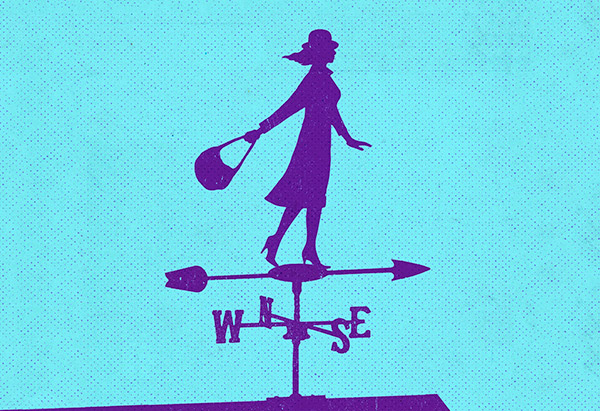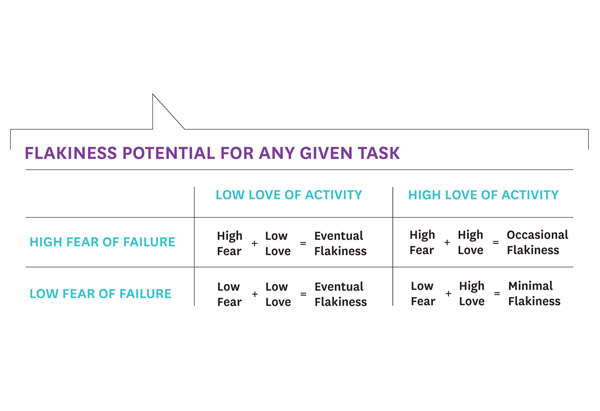Martha Beck's 5-Step Plan to Keep Flakes on Track
There are people for whom showing up, following through and getting things done seem almost impossible—and habitual scatterbrain Martha Beck is one of them. Good thing she has a five-step plan to keep flakes on track.

Illustration: Dan Page
This morning I was scheduled to take my car in for service, so I got up early, using two alarm clocks in case my brain ignored the first one. Then I spent an hour meditating outside. When my second alarm went off, two chipmunks were perched in my lap, so I kept sitting for five more minutes. Or 20, or whatever. Then I got dressed, stopping only to fix a broken shower rod, answer a phone call, and check my e-mail. I was just opening a kitten video when the car dealership called to ask why I was an hour late.
Welcome to the utterly exasperating world of a congenital flake.
You may have some experience with this problem. Perhaps you are flaky yourself—whether you were born that way or have flaked out as a result of the nonstop hurricane of information endemic to our era. Or maybe you're as focused as the Hubble telescope, but other people around you aren't. Wherever you fall on the flake-o-meter, understanding why people flake out—and knowing how to handle flakiness in yourself or others—is an essential coping skill that can save you all kinds of heartache and frustration. And late fees, too.
Why We Flake
In nature, sustained focus and distractibility are both highly useful traits. If a lion couldn't focus, it wouldn't have the patience to catch dinner; conversely, if a gazelle couldn't be distracted from grazing, it wouldn't notice and escape the lion. Since humans may be either predators or prey, evolution has given us both the power to focus and a propensity for distraction.
These qualities aren't blended equally in everyone. Some—say, Nobel Prize–winning physicists—can stay focused for decades. Others—say, me—set goals only to find themselves sitting with woodland creatures in their laps, oblivious to their own best-laid plans. Flakiness (or lack thereof) isn't entirely under our control. Each person's brain seems to decide at a subconscious level which things will grab her attention and which she simply won't notice. For example, consider the "cocktail party phenomenon": When some people hear their own name spoken by someone in a nearby conversation, their attention will be involuntarily diverted toward whoever is talking about them. Even if they wanted to, they could no more stop their attention from shifting than lift cars over their heads. The point is, our brains can attune themselves to things without our consent.
Business experts use the word "monochronic" to describe people who focus tightly on linear sequences of tasks. Folks who multitask and drift from one distraction to the next are called polychronic. Our culture has been deeply monochronic since the Industrial Revolution, when mass production suddenly made it essential to show up punctually and work in lockstep. Our schools and workplaces were designed to create reliable, undistracted laborers. Nowadays, we're more likely to work with information in ways no one had even imagined during the industrial era. Yet we find ourselves still trying to be monochronic in this wildly polychronic environment, creating stress that only makes us flakier.
Flake Management 101
Monochronic societies tend to deal with flakiness by trying to punish, lecture, and penalize it out of existence. This simply doesn't work. As I mentioned, what happens in the brain of a flake at the moment of flaking is usually an involuntary attention shift—and it's often based on stress. For example, contemplating finding a car dealership in an unfamiliar town stressed me enough that other mildly stressful things (a broken shower curtain rod, the multiple demands in my e-mail in-box) pushed me into serious loss of focus.
To reduce flakiness, you have to crank the stress down, not up, and increase enjoyment of the task at hand. Consider the table below.

To illustrate what's happening in the table, here's an example. Say it's your partner's job to wash the dishes—a chore he often neglects. Trying to eliminate his flakiness with anger and punishment (by screaming at him, say) will get his attention only in the short term. Over time, that endless cycle of condemnation and fear combined with his low enjoyment of the task will create exhaustion, resentment, and, therefore, involuntary, uncontrollable flakiness. Even if you remove the punishment for flaking, but there's still nothing to love about the task—and, let's face it, washing the dishes isn't exactly a thrill—you can expect anyone and everyone to flake out on it at least occasionally, if not regularly.
You might think that people would be most focused when they're doing something they love that also carries a high penalty for failure. Actually, this situation can create so much anxiety, it too can cause uncontrollable flakiness. (This is probably the reason that many surgeons won't operate on family members.) The only way to create sustained, reliable attention is to make an activity rewarding while reducing fears related to success. Which is why, though I regularly forget to have my car serviced on time, I never forget to sit around with chipmunks.
If you want flakiness to decrease, you must push everything you possibly can into the "low fear/high love" range. This creates something that we flakes call fun. In hindsight, it seems glaringly obvious that enjoyment decreases flakiness. Children who flake like baklava while in school can focus intensely and learn incredibly fast by playing games they enjoy. Adults can become far more productive when their work feels like play. In our distracted era, fun can fight flakiness. Once you've come to terms with that, you're ready to follow the steps below.
Anti-Flakiness Measures
Here's a short list of things you can do to help the flake in your life be more focused. They work especially well when the flake in question is you.
1. Acknowledge flakiness. Like addiction or illness, flakiness can be managed only when we admit it's there. Once you accept that a flake is flaky, you can roll up your sleeves and deal with the situation.
2. Allow wiggle room for flakiness. Everyone is flaky sometimes, so pick your battles. Direct strong focus toward your most important tasks and allow for a little flakiness in other areas. (Is it the end of the world if the dishes don't get done until tomorrow? Was this morning the only chance I had to get my car serviced between now and the end of time? In both cases, probably not.) When you or someone else flakes, take a cleansing breath and move on. Anger will waste your energy and make the condition worse.
3. Set up redundant systems to cope with flake-outs. At least my two alarm clocks got me out of bed today. If my appointment had been more pressing, I would have asked friends, family, and my virtual assistant to call and keep me on track. These multiple reminders are the only way I ever accomplish tasks I don't inherently enjoy. Set some up during a focused moment. You'll be awfully glad you did when the flakies set in.
4. Make use of short bursts of attention. You can't force focus for extended periods, so don't even try. If you've got an unpleasant, time-consuming task to tackle, take very small steps toward completing it interspersed with "flake breaks" that involve playing games, laughing, or moving around. This is what everyone's already doing, by the way. We might as well make it official.
5. Choose fun whenever possible. Spend time figuring out what feels fun to you and then do it. Help your boss, employees, spouse, children, dog, and tropical fish have fun, too. Consciously add fun to your daily activities—dance while you clean the house, listen to a comedy routine while you commute. The more fun you have, the more likely you are to figure out how, in today's wild new economy, you can make money doing what you love. Remember, fun is the new work.
And now a note for you focused monochrones: If you've never once flaked out in your life, you may be thinking, This is horse crap! These flakes just need to pull themselves together and behave reliably! Good luck with that. You might as well command my friendly neighborhood chipmunks to change your oil.
If, on the other hand, you're a natural-born, chipmunk-cuddling polychrone looking to get herself on track, managing your flakiness with understanding, tolerance, and positive reinforcement will eventually create the calm, enjoyable environment that finally helps you focus. Drop me a line telling me how it works for you. And please, if I forget to answer, don't take it personally.
Martha Beck is the author of, most recently, Diana, Herself: An Allegory of Awakening.



